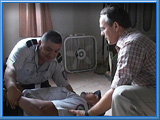Police Dept., Coast Guard and Customs train in CPR
 Cardiopulmonary Resuscitation; it’s a procedure that can turn the average Joe into a lifesaver. It is better known as CPR or mouth to mouth and it is something that, given the opportunity, everyone should learn in the event of an unexpected mishap. But for law enforcement officers, the probability of being in a situation where first aid skills are required is much higher than it is for the ordinary civilian. So this week, Police Department, Coast Guard and Customs Department personnel participated in eight hour training courses in CPR. Today was the last of the three individual departmental classes and News Five’s Delahnie Bain headed to the Embassy Hotel in Ladyville where it was the Customs Department being given a lesson in lifesaving.
Cardiopulmonary Resuscitation; it’s a procedure that can turn the average Joe into a lifesaver. It is better known as CPR or mouth to mouth and it is something that, given the opportunity, everyone should learn in the event of an unexpected mishap. But for law enforcement officers, the probability of being in a situation where first aid skills are required is much higher than it is for the ordinary civilian. So this week, Police Department, Coast Guard and Customs Department personnel participated in eight hour training courses in CPR. Today was the last of the three individual departmental classes and News Five’s Delahnie Bain headed to the Embassy Hotel in Ladyville where it was the Customs Department being given a lesson in lifesaving.
Delahnie Bain, Reporting
Disaster can strike at any time and because we don’t always see it coming, knowledge of first aid techniques is an important tool for saving lives when professional medical care is out of reach. The employees of the Customs Department were the third set of public officers to participate in a training course this week, where they were taught CPR techniques for adults, youths and infants.
Bonnie Martin Stuart, Proprietor, Martin Safety Consulting, Arlington Texas
“The important thing is not to hesitate to respond, to know the right things to do, how the importance of activating 911 immediately to get that advanced care there with all the medics there and oxygen. There are two links in that chain; there’s the person that activates 911 and there’s the person that does the hands CPR because without CPR and getting oxygenated blood to the brain you start getting brain damage in four minutes.”
First Aid instructor, Bonnie Martin Stuart of Martin Safety Consulting, was brought to Belize by the owner of Embassy Hotel in Ladyville, John Collier. According to Stuart, it is an important class because the techniques have changed over the years.
Bonnie Martin Stuart
“Years ago we use to two breaths, fifteen compressions; two breaths, fifteen; two breaths, fifteen; two breaths, fifteen. In that cycle of four, we would also stop and reassess. We also use to feel for a pulse; we don’t do that now. Now we do look, listen, feel; not breathing, no signs of life then we do two, thirty; two, thirty; two, thirty; two, thirty… and you keep doing that until you see signs of life because they said we were—by the time we get the oxygenated blood to the brain, we’d stop. So now we want to keep that going so there’s a better chance of survival.”
John Collier, Owner, Embassy Hotel
“I thought CPR and this course is so advanced, it’s unreal. It’s changed in the last seven years, even in the last three years. This is the most advanced course I’ve ever seen. I’m not gonna name other courses that you can take CPR, but I’ve never seen one this advanced. This instructor, she gets paid heavy and she came down and volunteered. This is all free.”
And the participants welcomed the training, which they say is essential in their line of work.
Camille Bleathman, Grade 2 Examiner, Customs Department
“It’s quite interesting and informative and I think it’s something that a lot of us take for granted. But until we come into a situation where it’s necessary then we really know that it is something we ought to have know before. It has changed a bit but the basics are still there, the fundamentals are still there and what’s necessary to do are still there.”
Delahnie Bain
“Why do you think this is something you should do; the members of the department.”
Camille Bleathman
“We’re located all over Belize and to render assistance anywhere, whether it’s in our workplace or in our homes, it’s always good to have the educational side of CPR.”
Gregory Noralez, Grade 2 Examiner, Customs Department
“The course has been very informative. It has been enlightening, especially since it is something that I did years ago and you know the tendency is that you forget sometimes and so this little refresher course will clearly help us especially where tourism is concerned.”
The course also covered shock management and bleeding control. At the end of the day, each participant was certified for two years. Collier says CPR is among the many training courses Collier hopes to facilitate in Belize.
John Collier
“We have a list of other people to come down to do training for the police, Customs, Immigration, Coast Guard, the Army; whatever they need. We just needed to know the needs.”
Stuart says, she comes to Belize along with her husband, at least three times a year and hopes to conduct more courses on future visits. Delahnie Bain for News Five.
Stuart’s husband, Robert Stuart, assists with the CPR courses. He is also a board member for the Embassy Hotel. Businesses wishing to be a part of the courses can reach Stuart at email address: bonnielmartin@sbcglobal.net.
